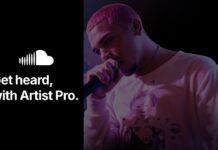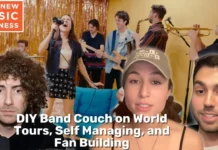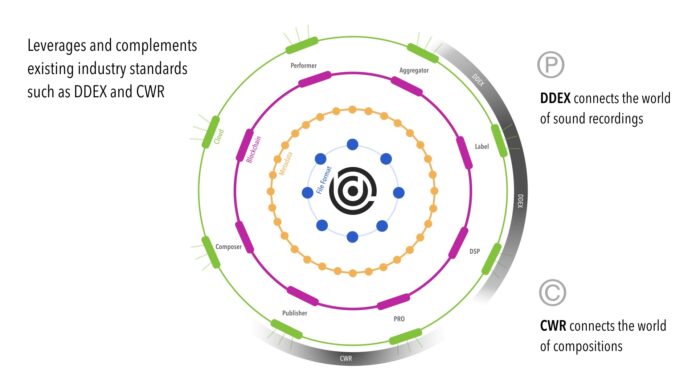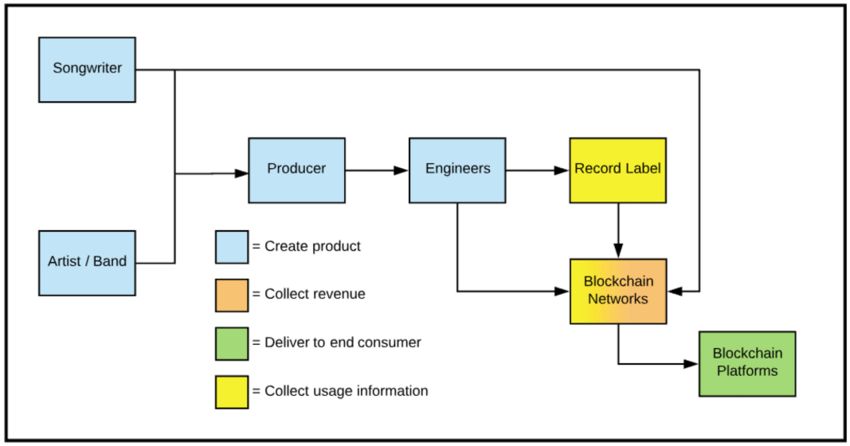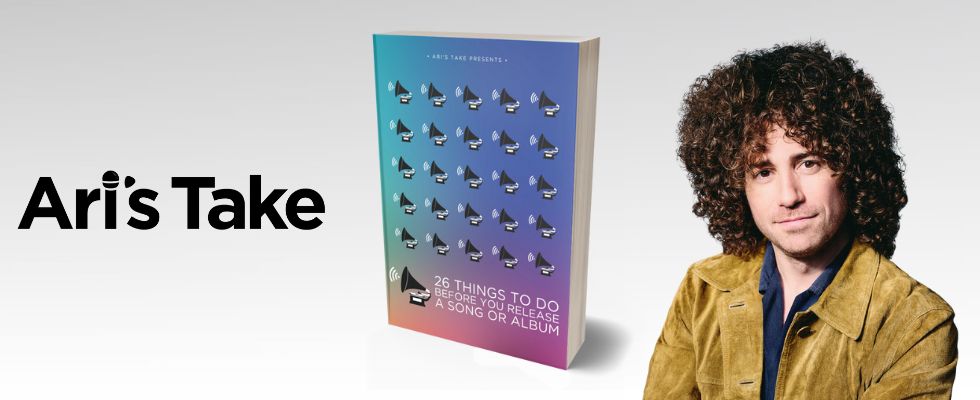This post is about blockchain technology, which makes some people’s eyes glaze over. But trust me, once you understand the basic idea, it’s actually easy to grasp.
And it’s all very exciting for indie musicians.
This post will cover how the blockchain can help credit and pay musicians more efficiently. Fingers crossed, it could help create a more equitable future for you and me.
+Imogen Heap is Building a More Equitable Future for Musicians (New Music Business podcast)
What Is Blockchain Technology?
Bitcoin. Ethereum. NFTs.
You’ve probably heard these terms. These are all digital assets that run on blockchain technology.
Cryptocurrency
Cryptocurrency is the most commonly known digital asset using blockchain. It’s an encrypted peer-to-peer payment system that involves no banks and no middleman.
NFT
An NFT is a digital item (often a piece of art, music, GIF, or video) that has no defined value. It’s invaluable, priceless. It’s a limited edition thing.
+NFTs for Music Explained (in Musician Terms)
But blockchain technology opens up an exciting new world for musicians ‒ far bigger than just cryptocurrency or NFTs.
I’m not a blockchain expert, but I’ve done my research (I’m also just fascinated by this stuff). So let me try to explain this technology as simply as I can…
Blockchain technology lets one person share something digitally directly with another person, no middleman required and completely encrypted.
The identities of both parties can be kept anonymous (thanks to end-to-end encryption), but anyone can see that person X sent person Z a digital thing.
How can everyone see that this transaction happened? (This is important for later).
Because every time one person sends something to another person, it’s recorded publicly and permanently on a “public ledger.” Once something changes hands on the blockchain, a record that that happened is available publicly, indefinitely.
So any digital data could, theoretically, be shared via the blockchain. Not just assets or art, but information. All of it encrypted and all of it recorded.
How the Blockchain Can Make Life Easier for Musicians
Yes, cryptocurrency and NFTs are cool, but the really exciting part for musicians is the underlying blockchain technology.
Crediting and Paying Musicians
According to Imogen Heap, the blockchain could make it way easier to pay musicians for their work.
In fact, it already has. Artists have sold NFTs directly to fans, like Grimes, Kings of Leon, and Ryan Tedder, among others.
Because NFTs are on the blockchain and everything is tracked, these artists also get a portion of each future sale of that digital art.
+NFTs for Music Explained (in Musician Terms)
But again, Heap is thinking much bigger than just NFTs…
Because the blockchain tracks every time data is shared (sort of like bread crumbs) this can be used to properly credit songwriters, musicians, producers, and anyone else involved in creating a song.
“We want to take away admin basically, because we want to get on with music,” Imogen Heap said during her interview with Ari on the New Music Business
So every plugin you use, every songwriter who’s in the studio contributing, every instrument that’s added to a song ‒ it can all be tracked on the blockchain in this ideal future.
Then people and organizations could go back and look at every step of the creation of that song.
This ensures proper credit to each person involved (it would also be super interesting for fans to see). And it’s all stored in one place: the blockchain.
“So this song has all of the information you might want to know about it. Everything. It has interactions, it has tweets about it, it has remixes, it has inspired pieces of artwork. It’s like this massive ball of stuff.” – Imogen Heap
She also said all of the services around the world could have access to this data on the blockchain ‒ if they pay for access to it (and remember, records on the blockchain are permanent and can’t be altered or removed). And then anyone who contributed to the creation of that song could be paid instantly.
This provides clear proof of who is responsible for what, ensuring each person can get paid properly and quickly. And ideally, this would involve as little admin as possible.
And Heap sees these possibilities on “something like blockchain.”
But people are already using blockchain to help musicians.
Verifi Media (formerly known as Dot Blockchain Media) is trying to simplify the process of tracking and sharing the data behind songs. They’re using a type of music file called .bc (or dotBC) that stores song info and metadata ‒ kind of like an MP3 does, but this metadata is written to blockchain.
What the heck does that mean? “Written to blockchain”?
Remember, data on the blockchain is encrypted and can only be opened by those with permission.
So basically, you can share music files and song data with only the people to whom you give permission. For example, you can share this data with anyone who downloads the song.
According to Verifi Media, you can also “message multiple parties through the song (each song like a Slack channel or a permissioned WhatsApp group to linked parties).”
Basically, there would be one central place with all of the song info, accessible by anyone who you’ve given access permission to. This also means all other parties, like DSPs (like Spotify, Apple Music, etc) and royalty collection companies, could access the song info from this one place.
Heap has a clear vision for doing this, which includes sharing the metadata with anytone who streams/downloads the song. She envisions sharing everything from lyrics to the equipment she used to full credits and more.
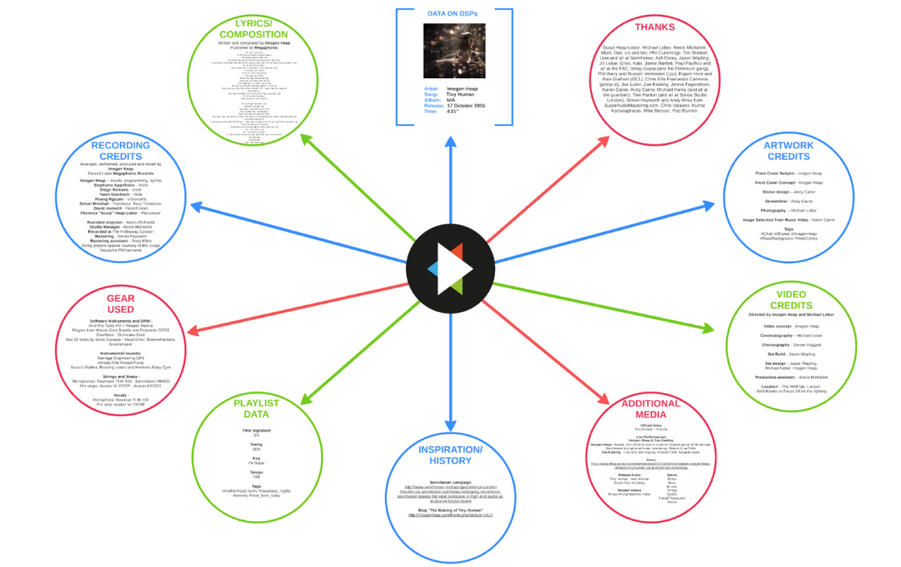
Smart contracts
Smart contracts are kind of like a typical e-contract, except it’s powered by blockchain.
This means streaming/download payouts and royalty payments could reach you faster. Everything would be easily tracked back to you via the blockchain.
For example, whenever a fan buys your song via the blockchain or streams your song on a blockchain-supported streaming network, the payout doesn’t have to go through a third party like a distributor.
It goes directly to you and everyone else involved in that song who is owed a royalty, according to the metadata stored in the music file.
In fact, Heap has already done this.
Her song “Tiny Human” was the “first song to automatically distribute payments via a smart contract to all creatives involved in the making and recording of the song,” she wrote on Medium.
Yes, digital distributors offer payment splitting. But going through the blockchain, payment is instant and no middleman is taking a cut.
So yeah, this isn’t just theoretical.
Audius: a streaming platform on the blockchain
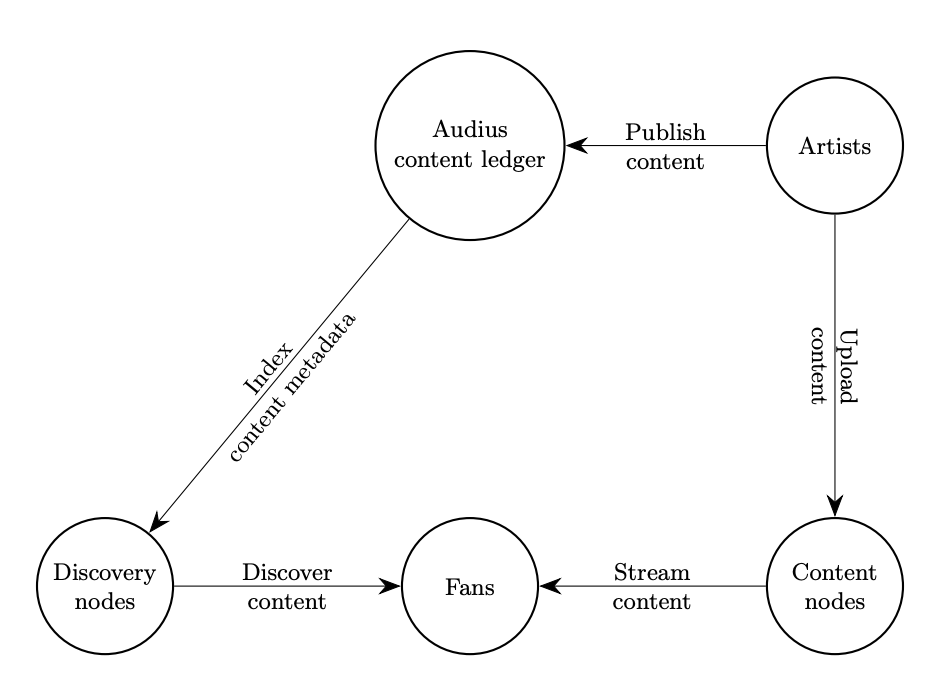
If you’re interested in exploring blockchain-based streaming, check out Audius.
It’s a “fully decentralized” music streaming platform built on public blockchain “and other decentralized technologies,” according to the white paper.
They have a public ledger for sharing songs and their metadata. Audio tracks and their contents are encrypted and can be unlocked for specific users. You can “directly engage with and transact with” your fans, separate from any middleman.
They’re already serving about a half a million users monthly. So if this topic interests you, you can learn more here and sign up for free.
Still a Long Way To Go
This is all very exciting stuff, especially for indie musicians like us. But there’s still a long way to go before this becomes the norm.
I’ll close out with an encouraging quote from Heap’s post on Medium…
“Now blockchain technology has the potential to allow for a seamless and equitable experience for creatives and those listening to music.
“Imagine: listening to a song automatically triggers an agreement for everyone involved in the creative process of a song with those who choose to interact with it — fans, streaming services, or film crews.”
I believe, along with many others like Heap, the blockchain will play an important role in a fairer future for musicians.

